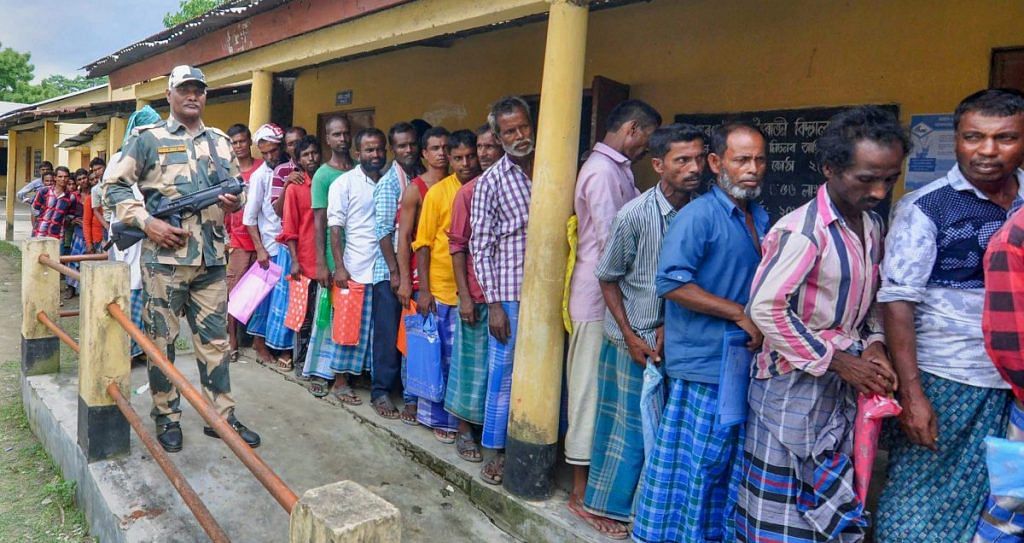Justice S.R. Sen’s comment reopened an unfinished Partition debate about Hindus and Muslims in South Asia.
Justice S.R. Sen’s provocative statement that India should have been declared a Hindu country in 1947 and that Prime Minister Narendra Modi’s government should save the nation led to the tired and customary nationalism vs secularism debate again.
There is a political perception that the Partition benefitted the Muslims of South Asia. They established a Muslim majority Islamic state and secured special privileges in secular India. But Hindus did not get a Hindu Rashtra and they are persecuted in Pakistan, Bangladesh and Afghanistan. Does the secular provision of Indian citizenship contradict with the interests of Hindus?
BJP leaders described Justice S.R. Sen’s remarks as an expression of national anxiety.
Secular citizenship and Hindu interests
The ‘natural right’ of Hindus to become Indian citizens is one of the most contentious political issues since 1947.
The creation of Pakistan on a religious basis and subsequent migration of communities across the borders provoked many members of India’s Constituent Assembly to demand that Hindus and Sikhs should be given unconditional Indian citizenship. Dr P.S. Deshmukh argued:
“If the Muslims want an exclusive place for themselves called Pakistan, why should not Hindus and Sikhs have India as their home? We are not debarring others from getting citizenship here. We merely say that we have no other country to look to for acquiring citizenship rights… so long as we follow the respective religions, should have the right of citizenship in India ….I do not think this claim is in any way non-secular or secretarian or communal.”
This line of argument did not survive and the Constituent Assembly finally adopted a secular definition of citizenship. Terms like Hindu, Muslim and Sikh were replaced by overtly secular categories. Even the frequently used expression ‘Hindu/Sikh refugees’ was intentionally excluded in the final version of the Constitution and the individuals who were coming from Pakistan were described as ‘migrants’ (Article 6, 7 and 8).
These secular principles of citizenship envisage a crucial distinction between the given, and somewhat fixed, religious cultural identities of an individual and his/her formal association with the state as a citizen. In this sense, an attempt was made to replace a permanent communal majority based on Hindu/Muslim distinction with what B.R. Ambedkar calls a political majority-based on rational secular principles.
It did not mean that this secular conception of citizenship ignored the plight of migrant communities or minorities who stayed back in India and Pakistan after 1947. The famous Nehru-Liaquat pact of 1950 is an example. Both the governments agreed to give citizenship rights to all communities and to protect the interests of minorities, irrespective of religion. These principles of secular citizenship in India were also followed in the preparation of the National Citizenship Register (NCR) in 1951.
Jawaharlal Nehru re-imagined the so-called Hindu interests and successfully launched a massive and overtly secular rehabilitation programme for accommodating migrant populations into the nation-building process.
Also read: For BJP and RSS, road to the Hindu Rashtra is not through Constitution
Did Muslims get Pakistan?
Pakistan authorities refused to take Muslim migrants from India in later years. The ‘permit system’ introduced immediately after Partition gradually evolved into the passport system. In fact, Pakistan did not commit itself to grant citizenship to all Muslims of South Asia. The migrant Muslim population was actually seen as an economic and social liability.
(Vazira Zamindar, 2007, The Long Partition and the Making of South Asia, London: Penguin/Viking, pp. 82-85)
This policy continued even after 1956 when Pakistan was officially declared an Islamic state. It did not offer citizenship to any individual only on the basis of his/her Islamic identity. Bangladesh also followed similar principles of citizenship. It also does not give any preference to Indian Muslims.
The Muslim citizens of India have to obtain a visa to visit Pakistan or Bangladesh. There is no official provision that allows them unrestricted access to these countries. The argument that Pakistan/Bangladesh is a ‘Muslim homeland’, therefore, is entirely misleading.
Also read: The good Muslim-bad Muslim binary is as old as Nehru
Natural rights of Hindus
The Citizenship (Amendment) Bill 2016 seems to have reopened the debate about the ‘natural rights of Hindus on Indian citizenship’. This bill aims to offer unconditional Indian citizenship to non-Muslim minorities of Afghanistan, Bangladesh and Pakistan. Although this bill does not exclusively talk about the ‘Hindu interests’, an implicit reference to Muslims is clearly made in it. The targeted countries are Muslim-majority states; and the communities that are defined as migrant ‘minorities’ are also non-Muslims.
The bill has been referred to the Joint Parliamentary Committee, which is supposed to examine a very delicate question: Should the religion of a person be treated as a criterion for India citizenship?
Pakistan, Bangladesh and Afghanistan are not Muslim homelands. These European-style nation-states recognised Islam as their national religion, and do not take responsibility of Muslim minorities.
India, which has posed a serious challenge to the idea of European nation-state model, is ironically in danger of deviating from its uniquely designed secular conception of citizenship in the name of ‘Hindu interests’.
Also read: What explains the Muslim silence in the face of BJP’s aggressive Hindutva?
Hilal Ahmed is a scholar of political Islam and associate professor at Centre for the Study of Developing Societies.
(ThePrint is publishing three series on minorities in India by Hilal Ahmed. The ‘Sarkari Muslim’, Minority Report, and Line of Law will trace the political journey of Muslims in the country. This is the second article under Minority Report.)
